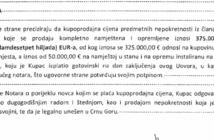The cost of fraud
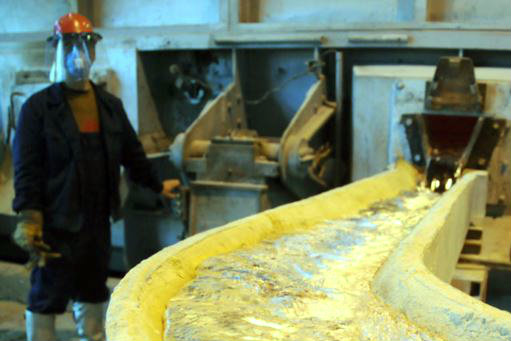 The only thing left after the sweet promises are empty factory halls, bare fields and unclosed construction sites. Since the Government transformed the disregard of sales contracts into acceptable behavior they are now trying to minimize the damage by using citizens’ money.
The only thing left after the sweet promises are empty factory halls, bare fields and unclosed construction sites. Since the Government transformed the disregard of sales contracts into acceptable behavior they are now trying to minimize the damage by using citizens’ money.
At the end of 1990 Montenegro proclaimed the principle of privatization of state enterprises. “We do not sell companies, but instead we buy good investors”, they used to say at that time. This was supposed to result with a meaningful process in which something is given for nothing, or almost nothing. It is true that several prominent investors operate in Montenegro who already had good reputation and among them there are a Japanese company “Daido Metal” which is probably the only example of perfect privatization – they privatized the Industry of sliding bearings from Kotor and not a single word of criticism against them was ever heard. Then, there is the “Deutsche Telekom”, “Telenor” and Norwegian-French “Socite Generale Group … who have a reputation of respectable international investors, but their arrival to Montenegro was marked by privatization, that is, concession unknowns.
Money laundering is a term that is often linked the Russian businesses. One of them is privatization of the hotel “Otrant” in Ulcinj.
Bosses and their fortune
The experience with “strategic partners” and “prominent investors” from Russia significantly damaged metal industry in which the Russian investors showed their quality as strategic partners. We will all remember the unprecedented bully behavior of the Russian Midland, who bought Steel Mill from Nikšić for a coupe of euros, which was supposed to be a paradigm of the principle of the “purchase by good investors”. A year has barely passed when a Russian, the so called, strategic partner, literally overnight fled from Montenegro. Before that he took everything the factory had in stock and after his departure the only thing that left was a bare wasteland.
These days similar thing is happening in the oldest plant of Steel Mill – cold rolling mill. The Russian-Swiss company “Tehnostil” became its owner in 2002. Only after dissatisfied workers of this company went on strike the public was acquainted with the fact that the most valuable machines had been taken abroad. The owners did not mind that it was these machines that were used in production of about 70 percent of the total production of this company, or the fact that they were pledged as a mortgage and security for the loan taken from the “NLB Montenegrobank”. Another thing is that 40 percent of the guarantees for this loan was provided by the Government of Montenegro. Minister of Economy Branko Vujović has recently stated that the government no longer even knows where the headquarters of the company “Tehnostil” is.
Much more important Russian investors than “Madiland” and “Tehnostil” in Montenegro is the Central European Aluminum Company of the Russian tycoon Oleg Deripaska which is part of his global company “Rusal”. “Russal” produced a several billion dollars debt all around the world. This billionaire, however, after the breakdown of the Aluminum Plant (KAP) failed to bring the company to its feet again without help of Montenegrin citizens’ money, and we will all remember the episode when the Russian oligarch, when negotiations got stuck, came to a flash-visit to Podgorica by his luxurious plane “Gulfstream”, which is among the best in the business class, whose value is estimated at around 40 million euros. This was somewhat under 49 million, which is the amount he had offered for majority shares of KAP.
Although the investors from all over the world are now present in Montenegro, in the past it was the Russian investors who brought the biggest amounts of money to Montenegro, as well as the most ambitious projects and most failed expectations. After the great promises the only thing that remained were the unfinished businesses, a bunch of debts and sea of problems. The exception is the hotel “Splendid” in Bečići which includes the Russian capital and whose primary business activity was not recognized as problematic so far.
 The inflow of Russian capital in Montenegro attracted even the attention of the Directorate General for External Relations of the EU. It was claimed in the report from the beginning of 2008, whose extracts were published in “Monitor”, which was produced due to the existence of allegations that “the Russians often launder money through Montenegro” and that the Russian businessmen take a great part in fundamental and hotel industry and real estate purchase, that “part of the Russian capital came to Montenegro through third countries – Great Britain, Cyprus, Switzerland, the world’s off-shore destinations, and through local companies, partly in cash, which means that the officially estimated share of 8.1 percent of Russian investments in Montenegro now makes more than 25 percent”. This fact was supported by the information presented in 2007 after the meeting Montenegrin Prime Minister Milo Đukanović and President of Russia Vladimir Putin according to which Russian investments in Montenegro at that time exceeded the amount of two billion euros.
The inflow of Russian capital in Montenegro attracted even the attention of the Directorate General for External Relations of the EU. It was claimed in the report from the beginning of 2008, whose extracts were published in “Monitor”, which was produced due to the existence of allegations that “the Russians often launder money through Montenegro” and that the Russian businessmen take a great part in fundamental and hotel industry and real estate purchase, that “part of the Russian capital came to Montenegro through third countries – Great Britain, Cyprus, Switzerland, the world’s off-shore destinations, and through local companies, partly in cash, which means that the officially estimated share of 8.1 percent of Russian investments in Montenegro now makes more than 25 percent”. This fact was supported by the information presented in 2007 after the meeting Montenegrin Prime Minister Milo Đukanović and President of Russia Vladimir Putin according to which Russian investments in Montenegro at that time exceeded the amount of two billion euros.
A joint venture Russian-Montenegrin company “Montenegro stars” which runs a chain of hotels consisting of: one five stars hotel – “Splendid”, neighboring “Montenegro” and “Blue Star” from Budva has a reputation of the best private hotel company in Montenegro. However, this company and its hotels have a history characterized by numerous suspicions and irregularities.
A famous Montenegrin architect Novak Jovović at the time of the construction of hotel “Splendid” said for the daily “Vijesti” that that facility was the biggest illegal construction on Montenegrin coast. “The hotel was built contrary to the urban plan and it did not fulfill urban-technical conditions for construction of the new building on the place where the former” Splendid” stood”. That was confirmed just before the opening of the hotel in 2006 by Žarko Radulović:” The hotel is being built for a year and a half, and we all knew that it had no building permit. If we had waited for the permission, the hotel would be completed in 2008”.
Then “Splendid” got a lot of publicity through the Montenegrin black chronicle which dealt with a series of bomb attacks that preceded the killing of a senior police officer Slavoljub Šćekić, who led the investigation about the alleged attempt of racketeering of the hotel owner. During the trial, the defendants’ lawyers pointed to interesting facts about the owners of the hotel.
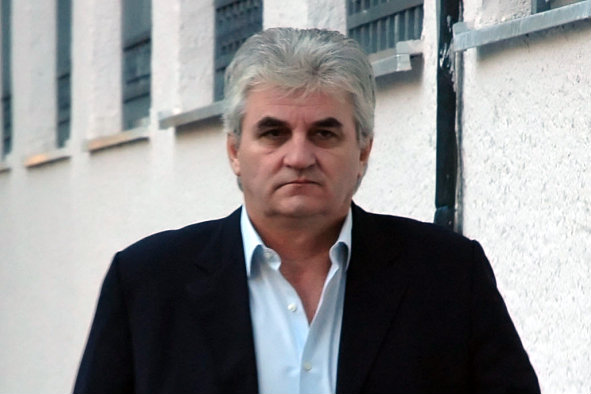 Answering the question of Zoran Vukčević’s lawyer – about whether Viktor Ivanjenko was one of the partners and a legal representative of the majority owner, the person who had been for a long time a general in the Russian secret service – KGB, and even its Head for a short period of time during the presidency of Boris Yeltsin, the minority owner and the Director of the hotel “Splendid” Žarko Radulović said he did not know. “I’ll ask him. I know that he is 60 because he has recently celebrated his birthday and I know he is a retired general”, said Radulović. After that Vukčević’s lawyer explained that they were talking about a person against whom Russia had led investigation for money embezzlement for a long time. The media have later connected all of this with the fact that Viktor Ivanjenko was a Director of the Russian giant “Jukos”, which was destroyed in a fight of the Russian government with once most powerful Russian oligarch Mikhail Hodorkovski.
Answering the question of Zoran Vukčević’s lawyer – about whether Viktor Ivanjenko was one of the partners and a legal representative of the majority owner, the person who had been for a long time a general in the Russian secret service – KGB, and even its Head for a short period of time during the presidency of Boris Yeltsin, the minority owner and the Director of the hotel “Splendid” Žarko Radulović said he did not know. “I’ll ask him. I know that he is 60 because he has recently celebrated his birthday and I know he is a retired general”, said Radulović. After that Vukčević’s lawyer explained that they were talking about a person against whom Russia had led investigation for money embezzlement for a long time. The media have later connected all of this with the fact that Viktor Ivanjenko was a Director of the Russian giant “Jukos”, which was destroyed in a fight of the Russian government with once most powerful Russian oligarch Mikhail Hodorkovski.
Actually the investments in tourism companies and hotels on Montenegrin coast show the entire (un)successfulness of Russian investors in Montenegro and discrepancies between the promised and the realized. Budva – a favorite subject of metaphorical expression of the promoters of domestic tourism: from the “tourism capital” which is a term dating from the socialist times until “Montenegrin Monte Carlo “, which is a recent product. However, instead of being the alternative to a fashionable resort on the Azure Coast, the capital of tourism has become a “Moscow on the sea.” This name was contributed, apart from the Russian expansion to the Riviera of Budva, by perhaps the most obvious illustration of the Russian megalomania, supported by the ruling structures in Montenegro.
Of a number of pompous announcements of construction of luxury hotel complexes on the coast, mainly on the Riviera of Budva, which would be part of international famous brands such as “Sheraton”, “Hilton”, “Four Seasons” at the end nothing happened. The results of promises are bare fields and never completed construction sites as is the case with the hotel “As” in Perazica do which was sold in 2002 to the Russian group “Njega turs”. This was the first big privatization in which the partners were Russian investors, and now, eight years later, instead of a luxury hotel piles of construction materials are spread all over the place. The opening is announced for the year 2011 but no one serious can be sure about it.
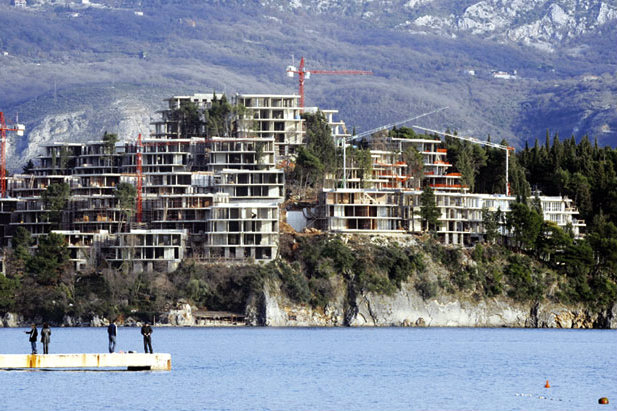 For the project “Astra Montenegro” on the hill Zavala near Budva there are even no announcements that could be at least a reflection of one’s desires. The company “Mirax” owned by the Russian tycoon Sergei Polonski is bankrupted (or not?) and now on the top of the hill Zavala instead of a tourist complex and a hotel in the shape of sail the abandoned construction site is standing. The case of Zavala is a continuation of a namby-pamby attitude of the state towards the investors which were expected to bring to Montenegro, apart from money, good business practices, social and corporate responsibility, respect for the environment, which should have a special status in an ecological state … Instead of these benefits, while the state turned its head to another side, illegal construction was continued in Zavala and when the company bankrupted the only thing that was left were crowded unfinished apartment buildings. The investor is left to decide when and whether he is going to finish what he had started. Zero responsibility, zero sanctions …
For the project “Astra Montenegro” on the hill Zavala near Budva there are even no announcements that could be at least a reflection of one’s desires. The company “Mirax” owned by the Russian tycoon Sergei Polonski is bankrupted (or not?) and now on the top of the hill Zavala instead of a tourist complex and a hotel in the shape of sail the abandoned construction site is standing. The case of Zavala is a continuation of a namby-pamby attitude of the state towards the investors which were expected to bring to Montenegro, apart from money, good business practices, social and corporate responsibility, respect for the environment, which should have a special status in an ecological state … Instead of these benefits, while the state turned its head to another side, illegal construction was continued in Zavala and when the company bankrupted the only thing that was left were crowded unfinished apartment buildings. The investor is left to decide when and whether he is going to finish what he had started. Zero responsibility, zero sanctions …
Zero is the information about the what is going on with the hotel in Petrovac, the former “4 July” and the present “Monte Casa” which was sold to the Russians for 2.6 million. The hotel was open in 2007, only after numerous warnings of the Ministry of Tourism about the termination of the contract. The media have once stated that this, one of the most beautiful hotels on the coast, has been empty for months, not only because there are no guests, but because neither the management nor the Russian owners, representatives of “Moscow Trust Group” care about and visit the hotel, even though they invested over 10 million euros in its modernization. This hotel, which did not work for years, was speculated to be a cover for money laundering, but nothing of the kind was found or proved so far.
And, the term money laundering has been connected many times with Russian businesses. Apart from the EU bodies, this problem was dealt with by the competent services from Montenegro and Russia. However, at least publicly, without any significant results – it all remained only doubts and claims that “the investigation is underway”.
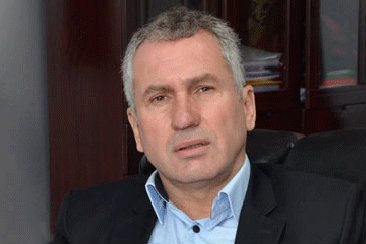 One of characteristic examples of privatization is privatization of the hotel “Otrant” in Ulcinj which was bought by the Russian company “Barkli”. President of “Šajo Group”, Žarko Rakčević, who also applied to the tender for this privatization, claimed during the five-year trial that the hotel “Otrant” in Ulcinj was illegally privatized with the elements of money laundering, saying that everyone starting from the President of the Commercial Court, through the Directorate for the Prevention of Money Laundering, to the Prosecutor’s Office is trying to hide what is a “strategic partner” who bought the hotel like.
One of characteristic examples of privatization is privatization of the hotel “Otrant” in Ulcinj which was bought by the Russian company “Barkli”. President of “Šajo Group”, Žarko Rakčević, who also applied to the tender for this privatization, claimed during the five-year trial that the hotel “Otrant” in Ulcinj was illegally privatized with the elements of money laundering, saying that everyone starting from the President of the Commercial Court, through the Directorate for the Prevention of Money Laundering, to the Prosecutor’s Office is trying to hide what is a “strategic partner” who bought the hotel like.
Rakčević‘s company requested disqualification of “Berkli” from the procedure of selling the “Otrant” hotel because it failed to meet the key requirements. Instead, “Barkli’s” bid was declared best and the hotel was sold to the Russians for 2.5 million euros and a five-year investment of 4.5 million euros. The Russians won the tender with only one point advantage over Rakčević’s company, which claimed that the new buyer of “Otrant” was a company in bankruptcy, which did not pay taxes, and that the payment was conducted through the biggest laundry money in Bulgaria.
Director of the Financial Intelligence Service of Russia Viktor Zubkov in September 2007 confirmed that his office was collecting information for two years about a “suspicious” purchase of the hotel “Otrant”. We have specific operational details and we will continue further investigation”, Zubkov briefly commented after the signing of the agreement on cooperation with Montenegrin Directorate for the Prevention of Money Laundering.
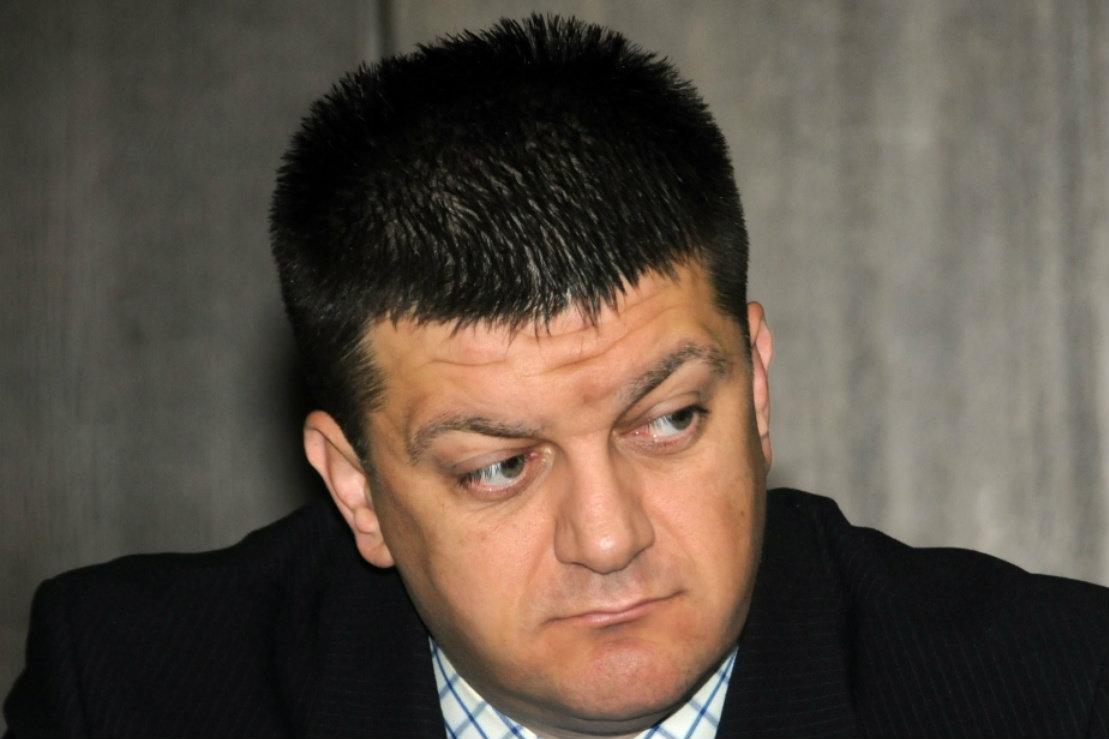 Almost a year later, in July 2008, the Director of the Directorate for the Prevention of Money Laundering Predrag Mitrović spoke about the case”Otrant”. And it is worth mentioning that there was exchange of intelligence data in several countries about this case. What we received we forwarded to the applicant – the Supreme State Prosecutor. Due to a specific nature of the operational data we did not get the approval for their further use in the procedure, because the information was obtained from various sources where it is necessary to comply with internal regulations and procedures. Therefore, the removal of confidentiality from these documents is only possible through the international legal assistance”, Mitrović said to the daily “Dan”.
Almost a year later, in July 2008, the Director of the Directorate for the Prevention of Money Laundering Predrag Mitrović spoke about the case”Otrant”. And it is worth mentioning that there was exchange of intelligence data in several countries about this case. What we received we forwarded to the applicant – the Supreme State Prosecutor. Due to a specific nature of the operational data we did not get the approval for their further use in the procedure, because the information was obtained from various sources where it is necessary to comply with internal regulations and procedures. Therefore, the removal of confidentiality from these documents is only possible through the international legal assistance”, Mitrović said to the daily “Dan”.
All in all the doubts launched by Rakčević have not even been officially either confirmed or denied.
All these activities, whether it is a privatization, a direct or a greenfield investment which in the meantime occurred, remained unfinished, have not been started … have in common one thing – apart from the country of the investors’ origin, the fact that the Government of Montenegro often, together with local governments, tolerates violations of laws and sales contracts.



